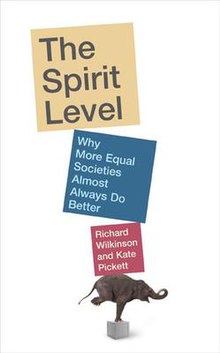The Spirit Level: Why More Equal Societies Almost Always Do Better

Front cover
|
|
| Author | Richard Wilkinson, Kate Pickett |
|---|---|
| Country | United Kingdom |
| Language | English |
| Subject | Socio-economics |
| Genre | Non-fiction |
| Publisher | Allen Lane |
|
Publication date
|
5 March 2009 |
| Media type | Print, e-book |
| Pages | 352 |
| ISBN | |
The Spirit Level: Why More Equal Societies Almost Always Do Better is a book by Richard G. Wilkinson and Kate Pickett, published in 2009 by Allen Lane. The book is published in the US by Bloomsbury Press (December, 2009) with the new sub-title: Why Greater Equality Makes Societies Stronger. It was then published in a paperback second edition (United Kingdom) in November 2010 by Penguin Books with the subtitle, Why Equality is Better for Everyone.
The book argues that there are "pernicious effects that inequality has on societies: eroding trust, increasing anxiety and illness, (and) encouraging excessive consumption". It claims that for each of eleven different health and social problems: physical health, mental health, drug abuse, education, imprisonment, obesity, social mobility, trust and community life, violence, teenage pregnancies, and child well-being, outcomes are significantly worse in more unequal countries, whether rich or poor. The book contains graphs that are available online.
In 2010, the authors published responses to questions about their analysis on the Equality Trust website. As of September 2012, the book had sold more than 150,000 copies in English. It is available in 23 foreign editions.
In a review for Nature, Michael Sargent said that "In their new book, epidemiologists Richard Wilkinson and Kate Pickett extend this idea" (of the harm caused by status differences) "with a far-reaching analysis of the social consequences of income inequality. Using statistics from reputable independent sources, they compare indices of health and social development in 23 of the world's richest nations and in the individual US states. Their striking conclusion is that the societies that do best for their citizens are those with the narrowest income differentials—such as Japan and the Nordic countries and the US state of New Hampshire. The most unequal—the United States as a whole, the United Kingdom and Portugal—do worst."
...
Wikipedia
